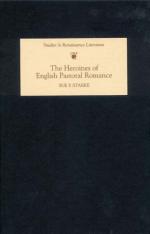|
This section contains 4,208 words (approx. 15 pages at 300 words per page) |

|
SOURCE: “The Argument of Spenser's Shepheardes Calender,” in ELH, Vol. 23, No. 3, September 1956, pp. 171-82.
In the following essay, Hamilton explores the larger meaning of Edmund Spenser's Shepheardes Calender—which he claims is the rejection of the pastoral life for the truly dedicated life in the world—by examining not what the poem has in common with other pastoral poetry, as has been the strategy of other critics, but by looking at what is unique in Spenser's re-creation of the pastoral form.
The critical attention given Spenser's Shepheardes Calender, apart from praise of the work as a brilliant poetical exercise, has mainly been to identify certain historical allusions. While the poem is deliberately designed, so it would seem, to provoke from the reader E. K.'s delighted response to “a prety Epanorthosis in these two verses” or “a very Poeticall πάθοs,” its brilliant rhetorical surface deliberately conceals reference, as...
|
This section contains 4,208 words (approx. 15 pages at 300 words per page) |

|


